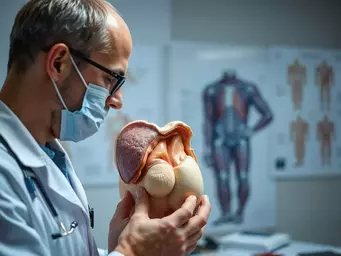Stress Relief for Hormonal Balance

Have you ever considered how stress might be silently undermining your hormonal health? The intricate relationship between stress and hormones, especially testosterone, can significantly impact your overall well-being. Understanding this connection is key to taking control of your health.
What You Will Learn
- Stress elevates cortisol levels, which can inhibit testosterone production and negatively affect mood and energy.
- Managing stress effectively can improve symptoms of hypogonadism, leading to better hormonal balance and vitality.
- Incorporating mindfulness practices and regular physical activity can significantly reduce stress and enhance testosterone levels.
- Quality sleep and a nutrient-rich diet are essential for optimal hormonal health and stress management.
- Social support and community engagement play crucial roles in emotional well-being and can aid in stress reduction.
The Stress-Hormone Connection in Hypogonadal Men
This visual illustrates the critical interplay between stress (cortisol) and testosterone in men's hormonal health, highlighting key symptoms and management strategies.
Stress & Cortisol Impact
• Elevated cortisol inhibits testosterone production.
• Leads to reduced libido, fatigue, mood disorders.
• Creates a vicious cycle of low testosterone & stress.
Testosterone's Essential Role
• Supports muscle mass, strength, and emotional stability.
• Low levels decrease motivation, increase irritability.
• Key for overall vitality and well-being.
Benefits of Stress Reduction
• Enhances mood and increases vitality.
• Improves testosterone production and hormonal balance.
• Mitigates worsening symptoms of hypogonadism.
Key Management Techniques
• Mindfulness & meditation practices.
• Regular physical activity (yoga, Tai Chi).
• Quality sleep & a nutrient-rich diet.
Understanding the Link Between Stress and Hormonal Health in Hypogonadal Men
As an endocrinologist, I've seen firsthand how stress can profoundly affect hormonal health, particularly in men experiencing hypogonadism. Testosterone plays a crucial role in overall well-being, influencing everything from mood to energy levels. However, when stress levels rise, the body produces higher amounts of cortisol, a hormone that can negatively impact testosterone production. Understanding this link is essential for managing hormone health effectively.
Elevated cortisol can lead to a cascade of negative effects, including reduced libido, fatigue, and even mood disorders. Imagine your body as a finely tuned machine; when one part is under excessive strain, the entire system can be thrown off balance. It's vital to recognize how stress not only affects our mental health but also our hormonal landscape.

The Role of Testosterone and Cortisol in Men’s Health
Testosterone is not just a hormone that influences physical strength; it is a key player in maintaining emotional stability and overall vitality. Conversely, high levels of cortisol from chronic stress can inhibit the production of testosterone, leading to symptoms such as decreased motivation and increased irritability. This interaction can create a vicious cycle where low testosterone contributes to more stress, further lowering testosterone levels. Research published in the Journal of Education, Health and Sport highlights the intricate relationship between stress, cortisol, and testosterone levels, underscoring the importance of stress management for hormonal balance.
- Testosterone supports muscle mass and strength
- Cortisol can lead to weight gain, particularly around the abdomen
- Low testosterone can affect mood and energy, increasing stress levels
Recognizing the balance between these hormones is essential in understanding how to improve hormonal health in men suffering from hypogonadism. By managing stress effectively, you can help restore this balance and improve your overall well-being.
Why Stress Reduction is Crucial for Hypogonadal Men
For men facing low testosterone levels, managing stress is not just beneficial—it's crucial. Stress can directly impact not only hormonal balance but also mood and energy levels. When my patients express feelings of fatigue or lack of motivation, I often look at their stress levels as a contributing factor. The European Journal of Health and Sport further emphasizes how stress can exacerbate symptoms of hypogonadism, making stress reduction an integral part of treatment.
Consider this: when cortisol levels are high, testosterone levels drop. This drop can lead to feelings of depression, irritability, and a lack of energy, which can make stress management even more difficult. Understanding this relationship empowers men to take proactive steps to mitigate stress, ultimately supporting better hormone health.
- Stress can contribute to worsening symptoms of hypogonadism
- Reduced energy levels can decrease motivation to engage in healthy activities
- Improved stress management can enhance mood and increase vitality
Effective stress reduction is essential for regaining control over your health. By incorporating stress management techniques, you can help to restore hormonal balance and improve your overall quality of life.
Pro Tip
Incorporating deep breathing exercises into your daily routine can significantly help lower cortisol levels. Just a few minutes of focused breathing can create a calming effect, promoting relaxation and supporting hormonal balance. Consider setting aside time each day for this practice to enhance your overall stress management strategy.
Summarizing the Importance of Stress Reduction Techniques
As we’ve explored, stress management plays a critical role in hormonal health for hypogonadal men. By implementing effective stress reduction techniques, we can enhance our overall well-being and improve testosterone levels. Here are some key takeaways:
- Understanding the interplay between stress and hormone levels is vital.
- Mindfulness practices such as meditation can significantly lower stress.
- Regular physical activity, including yoga and Tai Chi, promotes hormonal balance.
- Quality sleep is essential for optimal testosterone production.
- A healthy diet rich in specific nutrients supports stress management.
These strategies not only help in managing stress but also foster a supportive environment for our hormonal health. Remember, the journey to achieving hormonal balance is multifaceted and requires consistent effort.

Frequently Asked Questions (FAQs)
Taking Action for Better Hormonal Health
Now that we’ve discussed various techniques for managing stress, it’s time to take action! I encourage you to implement these strategies into your daily routine. Whether it's practicing mindfulness, engaging in physical activity, or improving your sleep hygiene, every step counts towards supporting your hormonal health.
Engaging with Professional Support
It’s crucial to seek guidance from healthcare professionals regarding stress reduction techniques and hormonal treatments. Having a supportive team can make a world of difference in navigating your health journey. Don’t hesitate to ask your doctor about tailored approaches that suit your individual needs. Remember, knowledge is power, and being proactive about your health can lead to significant improvements. For a deeper scientific understanding of these interactions, you can consult research like that published in Frontiers in Endocrinology.
The Benefits of Social Support and Community Engagement
Social support and community involvement play essential roles in enhancing emotional well-being and managing stress. Surrounding yourself with understanding friends, family, or support groups can create a positive environment that nurtures your mental health. Here’s how community engagement can benefit you:
- Provides a platform for sharing experiences and feelings.
- Encourages accountability and motivation in your health journey.
- Offers resources and information on stress management.
- Fosters a sense of belonging and reduces feelings of isolation.
By connecting with others, you can gain insights and encouragement that contribute to your overall well-being. At Hypogonadal Health, we're here to support you in understanding and managing the complexities of hormonal health. Together, let’s embark on this journey towards a healthier, balanced life!
Recap of Key Points
Here is a quick recap of the important points discussed in the article:
- Stress negatively impacts testosterone production in hypogonadal men.
- High cortisol levels from stress can lead to symptoms like fatigue, irritability, and decreased libido.
- Mindfulness practices and regular physical activity can significantly lower stress and improve hormonal health.
- Quality sleep is essential for optimal testosterone production and overall well-being.
- Engaging with social support and healthcare professionals can enhance stress management strategies.
Popular Posts
 What if the key to unlocking your vitality lies in understanding the hormones that influence your bo
What if the key to unlocking your vitality lies in understanding the hormones that influence your bo
 Recognizing that your environment can significantly influence your hormonal health is crucial. Have
Recognizing that your environment can significantly influence your hormonal health is crucial. Have
 Have you considered how fluctuations in your testosterone levels might affect your daily energy and
Have you considered how fluctuations in your testosterone levels might affect your daily energy and
 Trauma to the testicles can have profound effects on hormonal health, but understanding the causes a
Trauma to the testicles can have profound effects on hormonal health, but understanding the causes a
